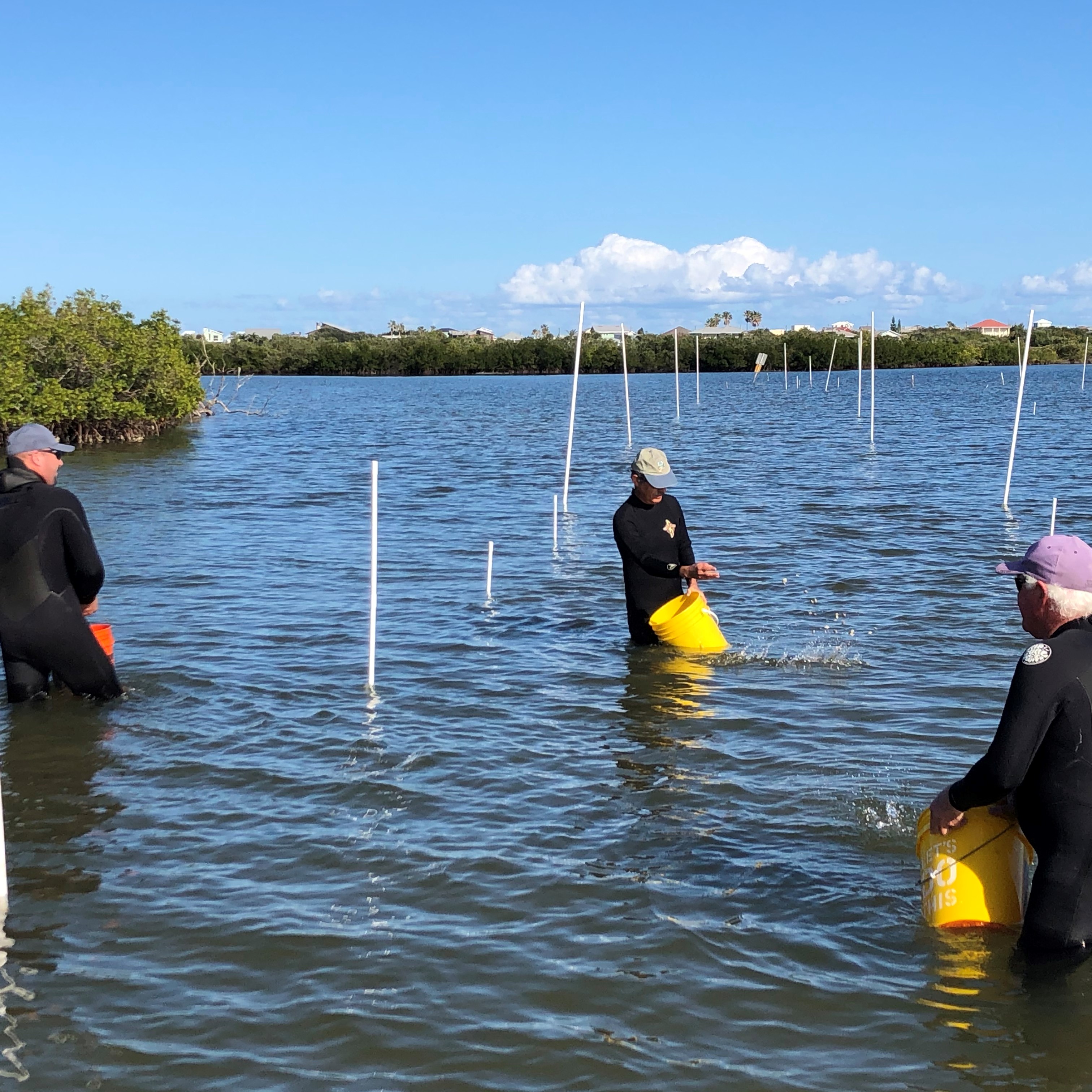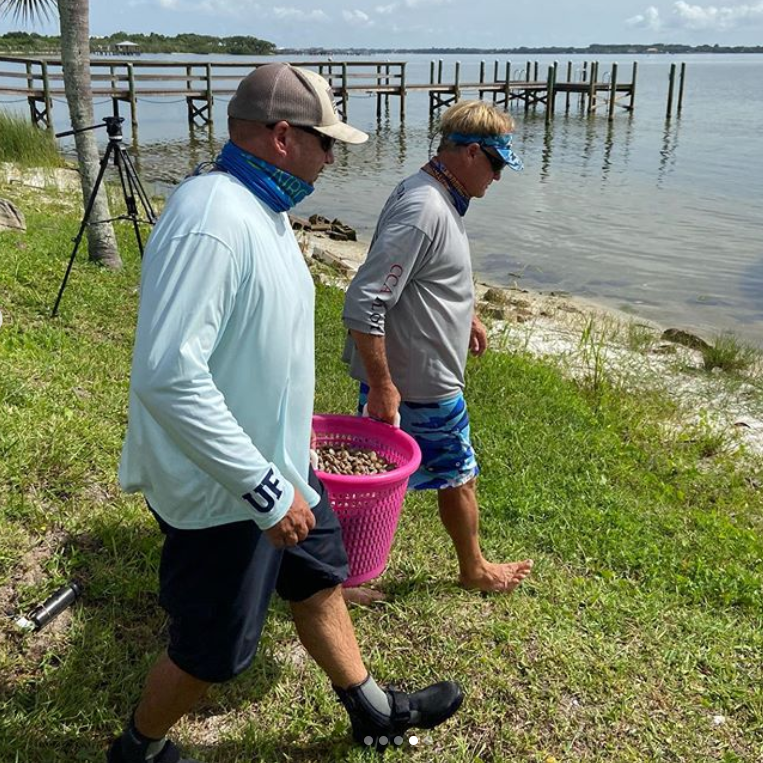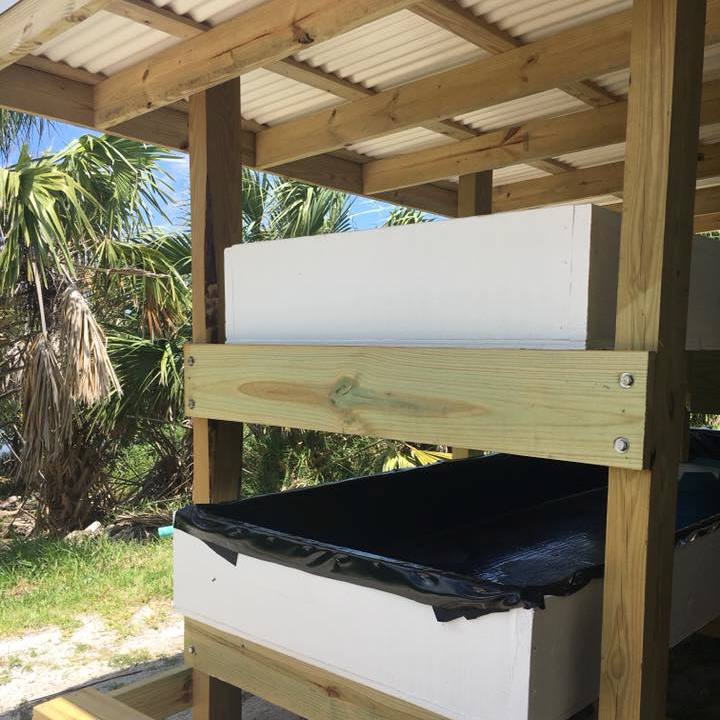 The Whitney Laboratory for Marine Bioscience
The Whitney Laboratory for Marine Bioscience

Whitney Laboratory along with partners are working to restore clam populations in the Indian River Lagoon. Your support of this project will help bring clams to the IRL with the goal of improving water quality and restoring healthy seagrasses to this important estuary in need of our help.
Make a Gift
The Indian River Lagoon Clam Restoration initiative entered its third year in 2021. In 2019, adult Mercenaria mercenaria clams were collected from Mosquito Lagoon and spawned. These “superclams” survived the brown tide and hypoxic event of 2012 and subsequent bloom events prompting Dr. Todd Osborne to believe these clams are genetically stronger and would produce progeny capable of survival in the Indian River Lagoon (IRL).
A total of 2.5 million clams were raised and repatriated to aquaculture lease locations in the IRL in the first year. During the pandemic, the project was able to maintain productivity with the strong collaborations between Blair Wiggins Outdoors, Premium Seafood Inc, St. Johns River Water Management District, Florida Fish and Wildlife Conservation Commission, The Coastal Conservation Association, Star Brite and the IRL Council. Project partners and Whitney researchers distributed more than 11 million clams at the close of 2021. Dr. Todd Osborne and Mr. Jose Nunez have secured funding from the IRL Council, FL DEP and private donor sources for 14 Mil additional clams from 2022-2024.
A significant portion of our current work is in collaboration with the Brevard Zoo in developing a new clam gardener program that has established 100 clam grow out sites within Brevard County that are being monitored by citizen scientists. This program will mirror the oyster gardener program in its punctuality and will allow Whitney researchers to gather spatially explicit information about clam populations in the IRL. Monitoring of water quality and natural recruitment will continue for the duration of this project.
The Indian River Lagoon Clam Restoration initiative entered its second year in 2020. In 2019, clams were collected from Mosquito Lagoon and spawned. A total of 2.5 million clams were raised and repatriated to aquaculture lease locations in the Indian River Lagoon. During the pandemic, the project was able to maintain productivity with the strong collaborations between the SJRMD, The Florida Fish and Wildlife Commission, The Coastal Conservation Association, Addictive Fishing Television, Premium Seafood Inc. and the IRL Council.
Project partners assisted Whitney researchers in distributing an additional 1.6 million clams with a target of 6.4 million more clams planted by the end of 2021. Dr. Todd Osborne and Mr. Jose Nunez have secured funding from the IRL Council, FL DEP and private donor sources. A significant portion of future work is in collaboration with the Brevard Zoo in developing a new clam gardener program that will establish 100 clam grow out sites within Brevard County that will be monitored by citizen scientists. This program will mirror the oyster gardener program in its punctuality and will allow Whitney researchers to gather spatially explicit information about clam populations in the IRL. Monitoring of water quality and natural recruitment will continue for the duration of this project.
Adult Mercenaria mercenaria clams (6-8 years old) were collected from Mosquito Lagoon in March 2019. These “superclams” survived the brown tide and hypoxic event of 2012 and subsequent bloom events. At the Whitney Laboratory bivalve hatchery, these clams were spawned and then raised in land-based and field-based nurseries. After approximately nine months, nursery-raised clams were repatriated to selected aquaculture lease locations in the Mosquito Lagoon and in the Indian River Lagoon (IRL) proper.
Of the 3-4 million clams that were reared during the first year of the project in 2019, 400,000 were moved to Mosquito Lagoon in December of 2019 and the rest will be out-planted to additional sites throughout the IRL by the spring of 2020. By then, the clams will be one year old and will be ready to begin spawning in the wild, jump starting their natural recruitment in this important estuary. Monitoring of water quality and natural recruitment will continue throughout the duration of this project.

Whitney’s Clams Restoration was in action on Friday, June 26 at a project site in the Northern Indian River Lagoon. Nearly 60,000 clams were deployed, bringing to date almost two million clams that have been raised by Whitney Laboratory and deployed to help improve water quality! Read More
